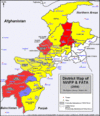|
Red agencies/ districts controlled by the Taliban; purple is defacto control; yellow is under threat |
With two days left before Pakistan’s Feb. 18 national election, the Taliban have stepped up terror attacks in the Northwest Frontier Province and the tribal agencies. At least 39 Pakistanis were killed and more than 120 wounded in two suicide bombings in the tribal agencies of Kurram and the settled district of Swat.
The larger of the two attacks occurred in the city of Parachinar in the tribal agency of Kurram. Thirty-seven Pakistanis were reported killed and more than 100 wounded after a suicide bomber drove a car into the middle of a crowd outside the office of a candidate of the Pakistan People’s Party and detonated his explosives. “A man with long hair drove a car into the crowd and blew himself up,” a witness told Geo News.
Kurram has been the scene of deadly sectarian violence between Shia and Sunni tribes over the past year. The anti-Shia group Sipah-e-Yazid, which is part of the Sipah-e-Sahaba Pakistan, and the Lashkar-e-Jhangvi have attacked Shia in the region. The Sipah-e-Sahaba is a Deobandi group funded by Saudi Wahabis and the Lashkar-e-Jhangvi serves as al Qaeda in Pakistan’s local forces.
The second bombing occurred in the settled district of Swat, where the Pakistani military has been conducting operations against Maulana Fazlullah and his Taliban forces. A suicide bomber rammed a van filled with explosive into a media center in the town on Mingora. Two Pakistanis were killed and 18 wounded in the strike.
The Northwest Frontier Province and the tribal agencies have suffered two other suicide attacks since Feb. 9. Ten were killed and 13 were wounded after a suicide bomber struck an office of the Awami National Party in North Waziristan on Feb. 11. Twenty-five Pakistanis were killed and 35 wounded after a suicide bomber attacked an election rally held by the Awami National Party in the settled district of Charsadda. The Taliban also kidnapped the Pakistani ambassador to Afghanistan as he drove through the tribal agency of Khyber on Feb. 12.
The recent violence directed at the political parties and polling stations in northwestern Pakistan makes the prospects of voting without violence poor. Prior to the recent attacks, the Pakistani government rated six of the 24 districts in the Northwest Frontier Province as having a “normal” security situation to allow for fair elections. The Islamists political parties are thought to be due for a major setback in the region after five years of failed governing. The military recently deployed 81,000 soldiers throughout the country to provide security on election day.








